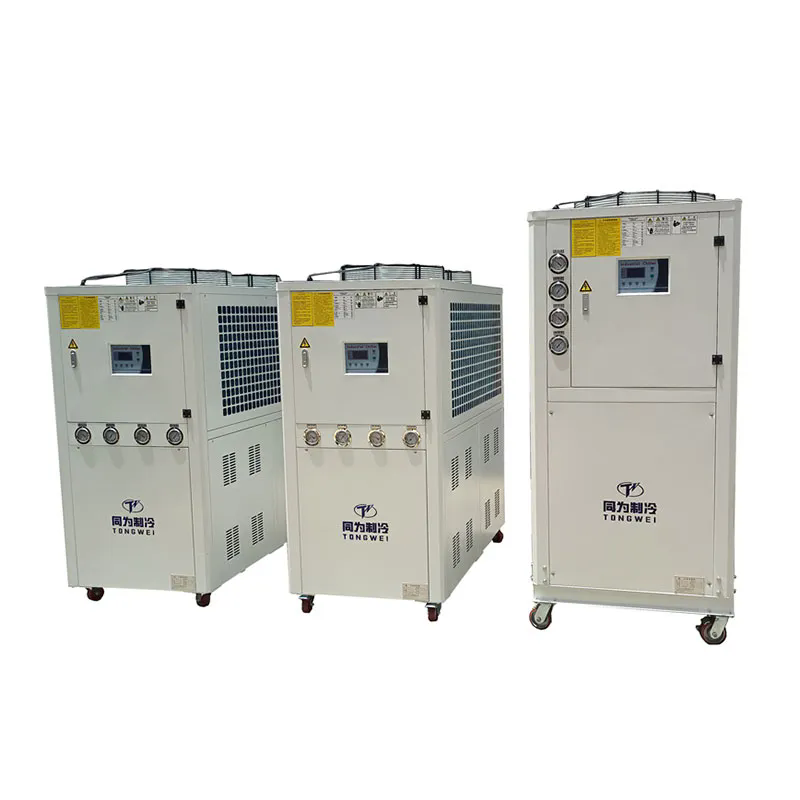Why Choose an Industrial Portable Deionized Chiller for Your Cooling Needs?
2024-11-05
In industries where precision cooling is crucial, finding the right equipment can make a significant difference. One solution that has gained traction is the industrial portable deionized chiller. But what exactly is it, and why is it becoming the preferred choice for businesses across various fields? This blog will break down the key benefits and uses of industrial portable deionized chillers, helping you understand why this option might be the best fit for your cooling needs.
1. What Is an Industrial Portable Deionized Chiller?
An industrial portable deionized chiller is a specialized cooling unit designed to provide precise temperature control while utilizing deionized water in its cooling process. Deionized (DI) water, stripped of minerals and ions, has a low electrical conductivity, making it ideal for sensitive applications where conventional water could cause equipment corrosion or interference. The “portable” feature means these chillers are mobile, allowing flexibility in placement and use across various industrial setups.
2. Why Is Deionized Water Essential for Cooling in Certain Industries?
Deionized water is preferred in many industrial cooling applications due to its non-conductive and corrosion-resistant properties. Conventional water contains ions that can lead to scale buildup, corrosion, and potential damage to sensitive equipment. In industries like electronics, semiconductors, and medical device manufacturing, even a trace amount of minerals can impact product quality and process stability. DI water avoids these risks, ensuring a cleaner, safer, and more reliable cooling environment.
3. How Does a Portable Deionized Chiller Improve Efficiency?
Portable deionized chillers are designed for efficient, on-the-go cooling. Their portability allows industries to deploy these units wherever cooling is most needed, avoiding the constraints of fixed systems. These chillers can support different operational needs, cooling specific machines or processes without disturbing the broader setup. They are particularly beneficial in manufacturing environments where changing layouts and flexibility are common, allowing businesses to maximize efficiency by cooling only the areas that require it.
4. What Are the Key Applications for Industrial Portable Deionized Chillers?
Industrial portable deionized chillers are popular in sectors where precision and contamination-free cooling are essential, including:
- Electronics and Semiconductors: Sensitive equipment like circuit boards and wafers require cooling free from ions that could lead to corrosion or interference.
- Medical and Laboratory Equipment: Equipment such as MRI machines, lasers, and lab equipment benefit from DI water cooling to maintain cleanliness and prevent contamination.
- Optics and Lasers: Laser systems often require precise temperature control to maintain beam quality, which is supported by the clean cooling offered by deionized water.
- Pharmaceuticals: The strict standards of pharmaceutical production require cooling that does not risk introducing contaminants.
5. What Are the Advantages of Portability in a Deionized Chiller?
Portability offers several benefits to industries that need flexible cooling solutions. Portable chillers can be moved to different areas as needed, accommodating production changes and seasonal demands. This is especially valuable in industries where equipment configurations are often altered or upgraded. Portable units also simplify maintenance, as they can be relocated for easy access during servicing, reducing downtime and helping maintain productivity.
6. How Do Industrial Portable Deionized Chillers Enhance Equipment Longevity?
The use of deionized water in cooling can significantly prolong equipment life. Minerals and ions in regular water can lead to corrosion, scale deposits, and fouling, which compromise equipment efficiency and lifespan. Deionized water minimizes these issues, providing a clean cooling process that doesn’t introduce additional wear on sensitive components. By investing in DI water cooling, industries can reduce the frequency of repairs and replacements, ultimately lowering maintenance costs and prolonging equipment life.
7. Are Portable Deionized Chillers Easy to Operate and Maintain?
Yes, industrial portable deionized chillers are typically designed with user-friendly interfaces and accessible components for easy operation and maintenance. Many models come with digital temperature controls, adjustable settings, and clear displays, allowing operators to monitor and adjust cooling levels with precision. Additionally, portable chillers often include safety features like overheat protection, which ensures smooth and safe operation even in demanding environments. Regular maintenance is straightforward, as the units can be moved for easy access and are designed to support quick filter changes and routine inspections.
8. How Do Portable Deionized Chillers Impact Energy Efficiency?
Industrial portable deionized chillers are typically energy-efficient, designed to cool only specific areas or equipment. This localized approach minimizes unnecessary energy expenditure, lowering overall power consumption compared to centralized cooling systems. Many modern units also come with energy-saving features like variable speed compressors and eco-friendly refrigerants, contributing to lower operational costs and reduced environmental impact.
9. Is an Industrial Portable Deionized Chiller a Cost-Effective Investment?
Given their durability, energy efficiency, and flexibility, industrial portable deionized chillers can be a cost-effective choice. Although the initial investment may be higher than standard water chillers, the long-term savings on maintenance, replacement, and energy costs often offset the price difference. Furthermore, the enhanced equipment protection and reduced downtime contribute to higher productivity and profitability.
Conclusion: Should You Invest in an Industrial Portable Deionized Chiller?
For industries requiring precise, contamination-free cooling, industrial portable deionized chillers are a highly effective solution. They offer benefits in portability, efficiency, and equipment protection, making them ideal for applications in electronics, medical devices, and other sensitive fields. By investing in a portable DI chiller, businesses can ensure safer operations, longer equipment lifespans, and lower maintenance costs. If your industry relies on precise cooling to protect sensitive equipment and maintain product quality, a portable deionized chiller could be a wise and valuable investment.



